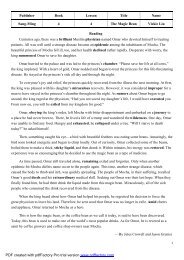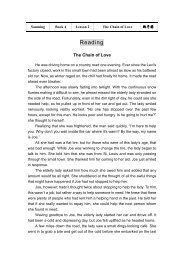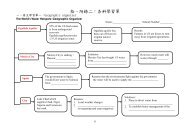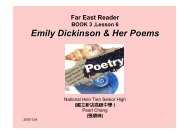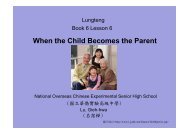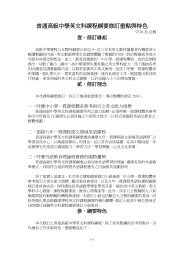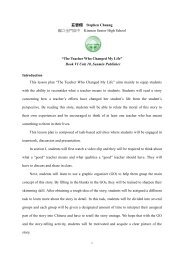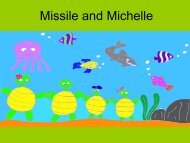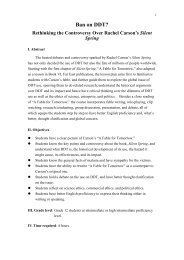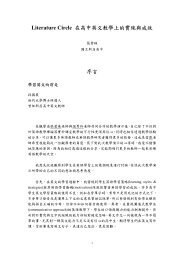Reading Logs: Integrating Extensive Reading ... - American English
Reading Logs: Integrating Extensive Reading ... - American English
Reading Logs: Integrating Extensive Reading ... - American English
Create successful ePaper yourself
Turn your PDF publications into a flip-book with our unique Google optimized e-Paper software.
• Speculate about information gaps. If<br />
the story does not say where or when<br />
events happened, the reader can speculate<br />
on the answers. This can also be<br />
done for clothes the characters might<br />
be wearing, the food they might consume,<br />
or the houses where they might<br />
reside.<br />
• Read a review. After reading a review<br />
of the story, the student writes down<br />
the reasons he or she agrees or disagrees<br />
with the reviewer.<br />
• Write a letter. The student, acting on<br />
behalf of a character in the story, writes<br />
a letter to the editor of a newspaper<br />
or to an advice columnist like “Dear<br />
Abby” regarding an issue that is relevant<br />
to the story. If another student in class<br />
is reading the same story, he or she can<br />
write a reply.<br />
• Imagine filming the story. Students<br />
reflect on what scenes from the story<br />
they would include in a film if they<br />
were the director. They write down<br />
how they would film special scenes and<br />
explain why they would choose certain<br />
actors for the film.<br />
• Provide your own ending. Students<br />
provide alternate endings for the story.<br />
• Give opinions about the story. Students<br />
write comments in two columns<br />
labeled “What I did not like about the<br />
story” and “What I liked about the<br />
story.”<br />
• Write down aspects of the culture<br />
reflected in the story. Readers compare<br />
and contrast cultural aspects in<br />
the story with their own society. After<br />
describing them, the readers can predict<br />
potential misunderstandings that<br />
might occur between members of the<br />
two cultures.<br />
In addition to the list that the teacher<br />
offers, students can devise their own components<br />
to suit their needs and interests and<br />
to express other feelings elicited by the story.<br />
For example, if students have started reading<br />
a book, and halfway through it they realize<br />
they do not find it exciting any longer, they<br />
can put it away and begin another one. They<br />
might then compose an entry that would<br />
explain what prevented them from finishing<br />
the story.<br />
Vocabulary strategies for the reading log<br />
Extending vocabulary is a challenge for<br />
most EFL learners due to the lack of exposure<br />
to <strong>English</strong>. Since books are often the<br />
only available source of authentic <strong>English</strong>,<br />
learners should seriously consider reading<br />
as a very effective alternative to other ways<br />
of enriching vocabulary. Books have current<br />
real-life language and language variety; they<br />
also contain language that is used in appropriate<br />
contexts, not as isolated language units<br />
(Larimer and Schleicher 1999). The meaning<br />
of words is not fixed, and can change with<br />
the context, and students will come to realize<br />
that extensive reading is an ideal way to learn<br />
the different shades of meanings and nuances<br />
of <strong>English</strong> vocabulary. <strong>Reading</strong> widely<br />
helps learners increase their range of language<br />
knowledge and develop a feel for <strong>English</strong>.<br />
This is especially true because people do not<br />
learn things in one pass; some researchers say<br />
an individual needs to come across a word<br />
17 times to learn it. Course books often focus<br />
on introducing new language but not on the<br />
amount of review necessary for acquisition,<br />
whereas literary texts recycle words and grammar<br />
structures and provide an opportunity to<br />
consolidate the language. Nation (1997) states<br />
that to remember a word, a learner has to keep<br />
meeting the word by doing reading in large<br />
amounts and/or engage in language-focused<br />
activity, such as keeping vocabulary notes.<br />
Following are a few suggestions for vocabulary<br />
strategies to include in the reading log:<br />
• Students do not need to write down<br />
every new word or phrase—only the<br />
ones they find useful and necessary to<br />
know.<br />
• Students should attempt to guess the<br />
meaning of the new word before looking<br />
it up. They can use the surrounding<br />
context by rereading the sentences<br />
before and after the unknown word.<br />
• Students can arrange vocabulary entries<br />
in various ways in the reading log, such<br />
as providing <strong>English</strong> definitions, illustrating<br />
the meaning through sentences<br />
either from the text or a dictionary, or<br />
creating a semantic web.<br />
• Students should be discouraged from<br />
collecting single words; people rarely<br />
speak by using only separate words,<br />
but instead use phrases, word combina-<br />
E N G L I S H T E A C H I N G F O R U M | N UMBER 1 2011<br />
31



